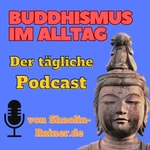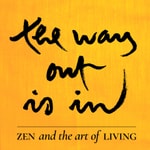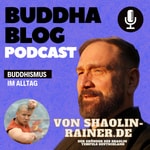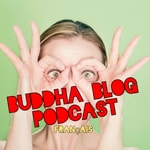Buddhism in daily life - Mindfulness in every day tasks – Details, episodes & analysis
Podcast details
Technical and general information from the podcast's RSS feed.
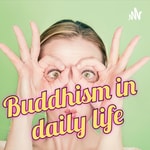
Buddhism in daily life - Mindfulness in every day tasks
Shaolin-Rainer
Frequency: 1 episode/1d. Total Eps: 364

Recent rankings
Latest chart positions across Apple Podcasts and Spotify rankings.
Apple Podcasts
🇺🇸 USA - buddhism
20/07/2025#78🇺🇸 USA - buddhism
18/07/2025#97🇬🇧 Great Britain - buddhism
17/07/2025#96🇺🇸 USA - buddhism
17/07/2025#67🇺🇸 USA - buddhism
15/07/2025#92🇬🇧 Great Britain - buddhism
05/07/2025#99🇬🇧 Great Britain - buddhism
04/07/2025#96🇬🇧 Great Britain - buddhism
03/07/2025#90🇬🇧 Great Britain - buddhism
02/07/2025#81🇬🇧 Great Britain - buddhism
01/07/2025#71
Spotify
No recent rankings available
Shared links between episodes and podcasts
Links found in episode descriptions and other podcasts that share them.
See all- https://shaolin-rainer.de/
2282 shares
- https://shaolin-rainer.de
2029 shares
RSS feed quality and score
Technical evaluation of the podcast's RSS feed quality and structure.
See allScore global : 58%
Publication history
Monthly episode publishing history over the past years.
Buddha Blog English Podcast Episode 16
Season 1 · Episode 16
mercredi 5 juillet 2023 • Duration 37:40
Buddha Blog English Podcast Episode 16
Hello and welcome to Buddha Blog, the Buddhist podcast. Your show for Buddhist topics, mindfulness and meditation. I am Shaolin Rainer, and I am very happy that you are here. Buddhism in everyday life - Mindfulness in every day actions
This podcast is largely funded by its listeners. I would be happy to welcome you as a supporter as well. Thank you to everyone who supports Buddha Blog in their own way.
Did you enjoy the podcast? Thank you for listening to Buddha Blog. Did you notice that there are no ads running here, that you are not inundated with consumer messages? Would you like to thank the author of this blog for his work with a donation? Support me, contribute to the extensive costs of this publication. Your support can help to continue the important work we are doing for Buddhism (my team and I). Please also download my app "Buddha-Blog English" from the Apple and Android stores. Via PayPal (click here) or by bank transfer: Account holder: Rainer Deyhle, Postbank, IBAN: DE57700100800545011805, BIC: PBNKDEFF
15-Buddha Blog English Podcast Episode 15
Episode 15
mercredi 28 juin 2023 • Duration 30:56
Buddha Blog English Podcast Episode 15
Hello and welcome to Buddha Blog, the Buddhist podcast. Your show for Buddhist topics, mindfulness and meditation. I am Shaolin Rainer, and I am very happy that you are here. Buddhism in everyday life - Mindfulness in every day actions
This podcast is largely funded by its listeners. I would be happy to welcome you as a supporter as well. Thank you to everyone who supports Buddha Blog in their own way.
Did you enjoy the podcast? Thank you for listening to Buddha Blog. Did you notice that there are no ads running here, that you are not inundated with consumer messages? Would you like to thank the author of this blog for his work with a donation? Support me, contribute to the extensive costs of this publication. Your support can help to continue the important work we are doing for Buddhism (my team and I). Please also download my app "Buddha-Blog English" from the Apple and Android stores. Via PayPal (click here) or by bank transfer: Account holder: Rainer Deyhle, Postbank, IBAN: DE57700100800545011805, BIC: PBNKDEFF
Buddha Blog Podcast Vol.6
mercredi 26 avril 2023 • Duration 24:10
Buddha Blog English Podcast Episode 6
Hello and welcome to Buddha Blog, the Buddhist podcast. Your show for Buddhist topics, mindfulness and meditation. I am Shaolin Rainer, and I am very happy that you are here. Buddhism in everyday life - Mindfulness in every day actions
This podcast is largely funded by its listeners. I would be happy to welcome you as a supporter as well. Thank you to everyone who supports Buddha Blog in their own way.
Did you enjoy the podcast? Thank you for listening to Buddha Blog. Did you notice that there are no ads running here, that you are not inundated with consumer messages? Would you like to thank the author of this blog for his work with a donation? Support me, contribute to the extensive costs of this publication. Your support can help to continue the important work we are doing for Buddhism (my team and I). Please also download my app "Buddha-Blog English" from the Apple and Android stores. Via PayPal (click here) or by bank transfer: Account holder: Rainer Deyhle, Postbank, IBAN: DE57700100800545011805, BIC: PBNKDEFF
264-Your best teacher is your last mistake- Buddhism in daily life
Season 1 · Episode 264
jeudi 22 décembre 2022 • Duration 05:56
Your best teacher is your last mistake
If we make one mistake and do not correct it, we are already making the second.
Mistakes are part of life, we all make mistakes.
The question is, how do we deal with it, what do we do when we realize the mistake?
Often we notice the mistake the moment we make it.
But what can we do, should we "fix it" even at the risk of "losing face"? Or look aside in shame and "forget about it"?
Buddha said: There are only two mistakes one can make on the path to truth - Not going all the way, or not starting it!
So, according to the historical great man, we should walk the path of reality, clearing the oversight. My mother always says, "Son, what is true you may say".
So a Buddhist should have the human greatness to admit his shortcomings, to stand by his actions, and to try to correct them if possible. Because according to Buddha, soft can be stronger than hard.
Shame is a natural feeling, such as when we have done something wrong, we feel ashamed. But isn't it clearly better for us if we overcome this brief moment of insecurity, muster the inner virtue and "fix" the mistake right now?
Yes, it is!
Because an oversight can quickly turn into a bigger lie, the untruth then gives rise to suffering, for us and for those around us, the popular saying goes: "a mosquito gives rise to an elephant".
Example: I do not tell my wife that a colleague "adores" me in the office. When she happens to see the co-worker with me on the street, she thinks I am having an affair with her. Because I did not clear up the mistake at the beginning, a real problem arises, we all know such situations, often it goes well, but sometimes "the shot backfires".
Learning from mistakes and mishaps brings us further, we also grow from the mistakes we make. But only if we stand by these "weak points", if we see them as part of our life, if we start to see our mistakes as positive as our strengths, because where there are no mountains, there are no valleys.
So, the next mistake you make, you should celebrate it, really celebrate it, enjoy it, because it is a part of your self, your being, your personality. Just like the solution to the problem, you should also "celebrate" it and "experience" it in its entirety.
In a great book I read: "For he who is free from error, let him cast the first stone".
When the first missionaries came to Africa, they had the Bible and we had the land. They asked us to pray. And we closed our eyes. When we opened them again, the situation was reversed: we had the Bible and they had the land.
- Desmond Mpilo Tutu - South African clergyman - born 1931
Copyright: https://shaolin-rainer.de
(Please also download my app "Buddha-Blog English" from the Apple and Android stores)
Please rate us on Apple, Google, or Spotify podcast to help us promote the show
263-Winter Solstice- Buddhism in daily life
Season 1 · Episode 263
mercredi 21 décembre 2022 • Duration 04:21
Winter Solstice
Twice a year the sun turns, from the highest to the lowest position of the sun.
Starting today, the days are getting longer again, life will soon awaken tentatively.
Already our ancestors revered the sun, myths were about the special days, special festivals were celebrated.
In the Germanic Julfest the Christmas festival could have its origin, also the celebrations around the sun god Sol are celebrated at the winter solstice.
You are a sun in my night. My night is a sun in yours
- Jean Genet - French novelist - 1910 to 1986
Since the sun remains stationary, anything that appears to be the movement of the sun is more likely due to the movement of the earth
- Nicolaus Copernicus - Prussian astronomer - 1473 to 1543
Some would also strike at the sun if it offended them
- Herman Melville - US writer, poet and essayist - 1818 to 1891
My Publikations:
1.) App "Buddha-Blog-English", see on Apple and Android stores
2.) The Webseite "Shaolin-Rainer", also as an App, on Apple and Android (with fully icluded translation from German to 163 languages (by Google))
3.) The App "SleepwithSounds" as a sleep aid or meditation timer, in Apple and Android stores
4.) Buddha Blog English Podcast (weekly)
5.) Buddhism in daily life Podcast (daily)
6.) Facebook (@BuddhaBlogApp) (mostly German)
7.) Telegram Channel: https://t.me/buddhablog (mostly German)
Copyright: https://shaolin-rainer.de
(Please also download my app "Buddha-Blog English" from the Apple and Android stores)
Please rate us on Apple, Google, or Spotify podcast to help us promote the show
262-Shi Miao Hai - Let Go and Enjoy- Buddhism in daily life
Season 1 · Episode 262
mardi 20 décembre 2022 • Duration 05:01
Shi Miao Hai - Let Go and Enjoy
I learned today that life can be like a roller coaster.
It always goes up and down, to the right and to the left, just like in life; sometimes we have many friends, sometimes we have little to laugh about, sometimes we have a lot of money, sometimes little, sometimes we are very lucky, sometimes not.
Often we deprive ourselves of the joy of life by holding on to conditions even though they are constantly changing.
So the art of life (if you want to enjoy the roller coaster ride) is to simply let go and put your hands up, we stay in our center and enjoy the ride, simply because we want to enjoy the moment.
Neither past nor future, but simply letting go and enjoying is the order of the day.
If we tense up and hold on the roller coaster, we would hold on to the worries and feelings, and not just let these things flow on. In order to find back to our inner center, we need to find ways to get things flowing again, so that we are not living in the past or the future, but also so that life can really flow.
In these stormy times, with many imponderables, more and more people are looking for a foothold in life. Here the teaching of the historical Buddha can become an anchor and a harbor. The core of the teaching is the journey to "awakening".
This journey begins, like every journey, with a small step.
Do you want to take this step? Just the first one? And then see how you feel about it, what your feelings are, what mood moves you, how your contemplation is reflected, whether the path "nestles at your feet"?
Let go and enjoy!
ALL CREATURES EXCEPT HUMANS KNOW THAT THE MAIN PURPOSE OF LIFE IS TO ENJOY IT.
- SAMUEL BUTLER - BRITISH WRITER - 1835 TO 1902
Copyright: https://shaolin-rainer.de
(Please also download my app "Buddha-Blog English" from the Apple and Android stores)
Please rate us on Apple, Google, or Spotify podcast to help us promote the show
261-"Draw me a sheep ..."- Buddhism in daily life
Season 1 · Episode 261
lundi 19 décembre 2022 • Duration 06:53
"Draw me a sheep ..."
Who knows this sentence? Correct, it comes from "The Little Prince" by Antoine de Saint-Exupéry, published at the time of the Second World War. I highly recommend the book, it is critical of the evaluation of outward appearances instead of human values, a clear criticism of the decay of the morals of that time (similar problems as nowadays as well).
Here is told about a small boy who comes from an asteroid. Since only he inhabits the celestial body (with a rose he loves so much) he travels to the planets in the vicinity, where he meets other (also lonely) people who live in their selfishness and carry their problems with them, important values have been lost for a very long time.
When he then comes to earth, the boy first meets a snake that wants to bite him, then a fox that explains the world to him. Thereby sentences of true greatness fall, like this: "you are responsible all your life for what you have made familiar to yourself".
Yes, as a Buddhist you also have to think about whether you make someone or something familiar to yourself, from the decision to call this or that 'my own' arises clear responsibility (regardless of personal karma).
Whether we get a dog or a cat, continue to meet with a 'date', open a business or take a job, beget a child, no matter what we make ourselves familiar is now in our area of responsibility, belongs to us. Unfortunately, very few people see it this way, in fact, many people take one partner after another (life partner, business partner, partner in every possible sense) without having thought about it beforehand, without having or wanting to take on a shred of responsibility, and thus create suffering in their counterpart. They consume people or things, without decency and values, simply without thinking further, without using even a thought to the possible consequences.
If I enter into any relationship, that is, go into my word, then I have thought about it carefully, not just out of boredom also 'still taken', I then have the decency to say NO even if I know that this situation is not for me, would only serve my distraction, has no substance and no value in my life.
It takes a certain size to say NO, an inner firmness. But if I don't want something (or someone) in my life, can't or don't want to take responsibility, then I have to say NO, because a wrong YES will often end in disaster (small or big shows time).
The sentence of Saint-Exupéry has influenced me very much, unconsciously I have acted according to it for a long time, only much later I became aware of the implications of his words: "responsible all my life for what I have made familiar to myself"!
However, my behavior is not a one-way street. As a studied lawyer I see "making familiar" as a kind of mutual contract. If now my "contracting party" breaks the trust agreement I can also terminate the contract, then I am released from my word. But otherwise the contract stands.
How much I would wish that more people read the "little prince", understand it and act accordingly.
Like in Buddhism! Right seeing, right recognizing, right speaking and right acting!
After a while the little prince recognizes the world fixated on externals, and returns to his rose on his planet.
Life is a journey. Do not take too much baggage with you
- Billy Idol - British rock musician - born 1955
Copyright: https://shaolin-rainer.de
(Please also download my app "Buddha-Blog English" from the Apple and Android stores)
Please rate us on Apple, Google, or Spotify podcast to help us promote the show
260-Buddhism is like riding a bicycle- Buddhism in daily life
Season 1 · Episode 260
dimanche 18 décembre 2022 • Duration 06:40
Buddhism is like riding a bicycle
To reach enlightenment you just have to keep riding!
Albert Einstein, whom I admire very much, said: "Life is like riding a bicycle - to keep your balance you have to keep moving"! An almost Buddhist saying, which is why his sentence inspired me to write today's article.
Whoever follows the teachings of Buddha can only have one goal: "Enlightenment"!
The legacy of the great man was his awakening, his message to us is that enlightenment is in everyone and can be achieved by all.
What do I mean by "Buddhism is like riding a bicycle?" Well, a Buddhist cannot follow the teachings of the historical model in 'part-time', either you are a Buddhist, or you are not.
Thus, the philosophy of Buddha penetrates into all areas of our lives, such as the way we treat other people, what and how we eat, how we earn our living, how we look at things, even our political attitude, but also general views on life, as in the great religions (charity, decency, honor), are influenced.
In this context, it is not so easy to "stop the bike", to pause the ride. A big problem for outsiders are the confusing "rules" of the different Buddhist communities, depending on the various Buddhist branches, the guidelines differ partly very much, quite different traditions developed in the different Asian countries.
I follow the Buddhist lineage of Shaolin Temple, which was founded by Bodhidharma around 500 AD. This philosophy of introspection, derived from Mahayana Buddhism, is called "Chan Buddhism" in China, while in the West its teachings became known as "Zen Buddhism".
Characteristic of Chan (Zen) is meditation (mindfulness or concentration exercises) as a spiritual practice that expands consciousness. The goal is the experience of enlightenment (as exemplified by the historical Buddha). It is important for all Buddhists to always continue the journey (with the imaginary bicycle), not to stop the aspirations, not to interrupt the journey to enlightenment.
Joachim Ringelnatz wrote the following in 1933: In Hamburg lived two ants who wanted to travel to Australia. Near Altona on the Chaussee, there their legs hurt, and there they wisely then renounced the last part of the journey.
The journey to "enlightenment", there can also sometimes 'hurt our legs', there can be setbacks, self-doubt, perhaps lack of understanding in the environment, why am I doing this, is this really the right thing for me, can I also achieve awakening?
Yes, we can, the historical Buddha has left us his message, his legacy, everyone can awaken, enlightenment is already within us, we have to bring it out from under the many broken pieces of our lives, sweep the dust from our souls, find our true being again under all the rubble of our history.
No one said the journey would be easy, that our legs wouldn't hurt along the way. But the journey is worth it. Promise! Just keep going!
Listen to the article as a podcast click
To travel with a guide is a blessing, to travel without one is the opposite
- Mark Twain - American writer - 1835 to 1910
It is not the destination, it is the journey
- Ralph Waldo Emerson - American philosopher and writer - 1803 to 1882
Only through regular exercise could one move forward
- Johann Wolfgang von Goethe - German poet - 1749 to 1832
Copyright: https://shaolin-rainer.de
(Please also download my app "Buddha-Blog English" from the Apple and Android stores)
Please rate us on Apple, Google, or Spotify podcast to help us promote the show
259-The truth about wolves- Buddhism in daily life
Season 1 · Episode 259
samedi 17 décembre 2022 • Duration 06:06
The truth about wolves
There are two wolves living in us; one wolf is bad, he stands for bad qualities like arrogance, jealousy, greed, envy and jealousy. The other wolf is good, representing peace, goodness, hope and love.
These two wolves are in each of us, fighting daily against each other, consciously or unconsciously.
The wolf that we feed, that we pay attention to with our thoughts, that we spend our energies on, will win.
You can see a thing this way or that way, express yourself about it this way or that way, put your focus this way or that way.
Example:
Option A - I am so exhausted from all the work, never having any money, having to raise my children, and now also taking care of my sick mother
Option B - I am so happy that I have enough work, money is tight but I manage, my children are a complete joy, my mother lives with us now, that's nice.
We are often not aware of how we evaluate things, but an attentive listener can already recognize our thoughts and feelings from the energy of the words.
What can we do, how can we improve ourselves here?
First we should ask ourselves if we want to improve at all, which wolf we will feed in the future, how our energy should be from now on.
Then we can consciously pay attention to our thoughts, such as replacing an "I must" with an "I will", integrate the mindfulness taught by Buddha into our lives, become attentive to the energies. Right cognition, right thinking, right acting and right speaking can be practiced, this strengthens one's self, one's character, one's personality.
As a next step we should get used to distinguish the two wolves, to train ourselves to feed only the 'good' wolf, for example by starting to look forward to everyday things. I look forward to cooking dinner (for me and my family), I look forward to doing laundry, I look forward to cleaning day, I LOOK FORWARD TO ..............
Such an approach makes us humble and grateful, thankful for every moment, for every day, for every encounter.
Whether success or failure, I am glad for every experience, it makes me grateful and happy to be able to "experience", to "be", to be human.
Search in your memory palace for the two wolves, give them a name, personalize the two. Talk to the wolves inside you, become aware of them.
See how you can get rid of the bad wolf!
I will not miss fighting, fighting will miss me
- Muhammad Ali - former US boxer - 1942 to 2016
I fight, I fight to win
- Margaret Thatcher - Prime Minister of the United Kingdom - 1925 to 2013
When we fight evil, we fight the most terrible thing of all: Indifference
- Robin Williams - US actor and comedian - 1951 - 2014
Copyright: https://shaolin-rainer.de
(Please also download my app "Buddha-Blog English" from the Apple and Android stores)
Please rate us on Apple, Google, or Spotify podcast to help us promote the show
258-The Robber Aṅgulimāla - the Story of the 99 Cut Off Fingers- Buddhism in daily life
Season 1 · Episode 258
vendredi 16 décembre 2022 • Duration 06:07
The Robber Aṅgulimāla - the Story of the 99 Cut Off Fingers
Aṅgulimāla was a murderer at the time of the historical Buddha.
He was a student at the college, he came from a distinguished family.
Legends tell of his extraordinary good looks. His teacher's wife was also more fond of him than other students, but he refused further contact. Thus, the race woman is said to have been incensed by the rejection. She told her husband, the teacher, that Aṅgulimāla wanted to rape her, but she was just able to prevent it. Her husband became jealous, and began to give the student false advice.
So he should strive for "enlightenment", and for this purpose cut off a finger of 100 people, then he would enter "nirvana".
The young man was probably very handsome, but somewhat simple-minded, he set out to fulfill the task set by the teacher. When he found that no one wanted to "donate" a finger for the personal "enlightenment" of the Aṅgulimāla, he proceeded to kill people, cut off their coveted finger, and then "thread" it on a necklace. This is how he got his name, Aṅgulimāla, which translates roughly as "finger necklace."
The powerful serial killer had already threaded 99 fingers onto the necklace when he met the historical Buddha. The latter was to contribute the hundredth finger to the collection, so that he could finally experience "enlightenment". Buddha was not particularly strong, characterized by meditation and asceticism, a simple victim. Thought the killer!
Although the robber ran after Buddha with speed and strength, he could not reach the slowly holy man. Exhausted and full of frustration, Aṅgulimāla called out to Buddha to stop.
Buddha turned around with no apparent emotion, and told Aṅgulimāla that he had been standing for a long time after all, and it was time for Aṅgulimāla to stop as well, to stop killing, to stop hurting other people because of his ego.
Something about the Buddha's person and his words must have touched Aṅgulimāla deeply, he threw away his weapons and followed the Buddha to a monastery where he became a monk, the "enlightenment" struck him like lightning.
The king wanted to arrest Aṅgulimāla and found him together with Buddha in a temple. He paid his respects to Buddha and asked his opinion. The Buddha answered the king: what you could not achieve with weapons, you could easily achieve with the right words!
Impressed, the king moved on with his army, leaving Aṅgulimāla to the Buddha's benevolence.
THE LESSON OF THE STORY?
Even extreme circumstances can be overcome, people can change, one can grow from the right example. Yesterday is not today, what will be tomorrow we do not know. In the moment lies the power, who we meet, which circumstances influence us, also our karma holds lots of surprises.
Have you met the Buddha yet?
HISTORY TEACHES PEOPLE THAT HISTORY TEACHES PEOPLE NOTHING
- MAHATMA GANDHI - INDIAN LAWYER - 1869 TO 1948
Copyright: https://shaolin-rainer.de
(Please also download my app "Buddha-Blog English" from the Apple and Android stores)
Please rate us on Apple, Google, or Spotify podcast to help us promote the show


